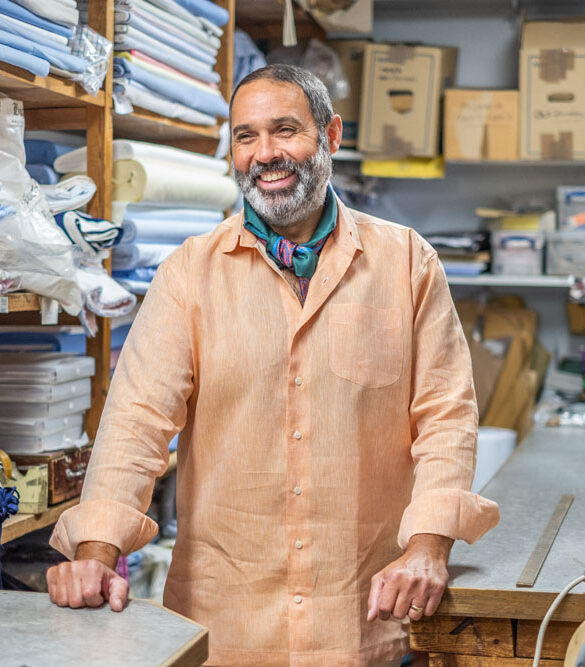Jermyn Street is the synonym for the English shirtmaking tradition. There, or more precisely at Piccadilly Arcade, bespoke shirts are cut on the premises of Budd Shirtmakers. We have met the shirtmakers at a trunkshow in Germany a while ago, now we spoken to them on the phone for this interview.
Feine Herr: Could you please introduce yourself to our readers? Who are you and what do you do?
Darren Tiernan: My name is Darren Tiernan. I am Senior Bespoke Cutter at Budd Shirtmakers in London.
How would you characterize your shirts?
We are a classical London shirtmakers, cutting and making all of our shirts by hand. We offer bespoke, made to measure and ready to wear shirts, all cut by us and sewn together by the team of shirtmakers at our workshop. Our shirts are in the Jermyn Street tradition and have a forward collar, cut to our house style.
What is the difference between your rtw shirts and the bespoke outside the obvious difference regarding the pattern? What do all your shirts have in common?
One of the most special things about Budd’s shirts is the continuity between the construction, cloth and details. With bespoke, we are obviously cutting a unique pattern for the individual customer, working to specific measurements and stylistic requirements and their chosen cloth, cutting the shirt individually. From there, however, the process for all of our shirts is fundamentally the same. This includes the hand-turned, soft colour with floating lining and attached with double row of stitching so that it can sit well with or without a tie, 36 component parts plus buttons for each shirt, single need stitching throughout, hand-set sleeves, hand-folded and lined placket, ethically sourced mother-of-pearl buttons.
People often think of English shirts as being generously cut. Does this apply to your bespoke shirts too? Or is the cut completely up to the customer’s wishes?
In the past, a classic, generous cut would have been a typical London shirt and that was very much the trend. Today, the tendency lies towards a more tailored look and is what that we have always done, particularly in our bespoke work where we work to fit and flatter the form. We have seen the trend for “slim “ shirts which end up being tight and ill-fitting and we tend to advise many customers against them. I always try and go for the most flattering, comfortable and practical look for customers.
What is your opinion about fused versus unfused collars?
Different shirt makers from different countries have different traditions when making. I’m not opposed to fusing and have seen some nice fused collars from other shirtmakers but people come to Budd for the classic English look which means a floating cotton canvas construction. It is our tradition and how we are used to making.
Not many shirts sold in Jermyn street are made in England. How English are your shirts?
We cut our bespoke shirts in our cutting room above the shop in London. Our made to measure and ready to wear shirts are cut directly at our workroom in Andover, Hampshire. This is also where we sew them together. Andover is about an hour from London and is where I am answering you from during Lockdown 3.0. I am working from here whilst the London shop is closed. Our large space is Covid safe and socially distanced.
You wear a wonderful suit and presumably a bespoke shirt. Could you tell us about your personal preferences regarding suits, ties, shirts and shoes?
I keep things quite plain and classic when it comes to my business attire but am also very privileged by the brands and suppliers that surround us. I tend to opt for a simple (bespoke) white or blue shirt, cut preferably from Alumo’s Supraluxe or Soyella cottons, and pair it with a plain knitted silk or grenadine tie, normally in navy. I am lucky enough to own several bespoke suits, but my favourite is a wonderful Anderson & Sheppard suit. I wear Cleverley shoes with my business attire which round off the whole English and very London look.





